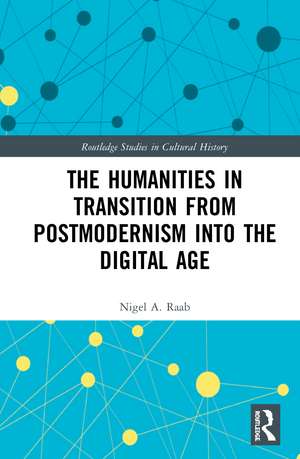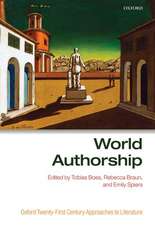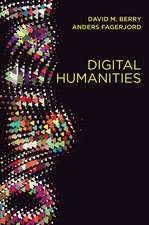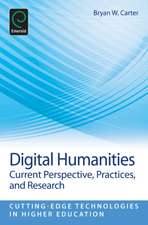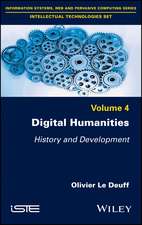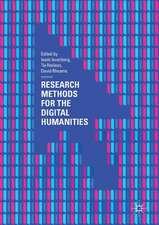The Humanities in Transition from Postmodernism into the Digital Age: Routledge Studies in Cultural History
Autor Nigel A. Raaben Limba Engleză Hardback – 16 iul 2020
The Humanities in Transition explores how the basic components of the digital age will have an impact on the most trusted theories of humanists. Over the past two generations, humanists have come to take basic postmodern theories for granted whether on language, knowledge or time. Yet Michel Foucault, Jacques Derrida and similar philosophers developed their ideas when the impact of this digital world could barely be imagined. The digital world, built on algorithms and massive amounts of data, operates on radically different principles.
This volume analyzes these differences, demonstrating where an aging postmodernism cannot keep pace with today's technologies. The book first introduces the major influence postmodern had on global thought before turning to algorithms, digital space, digital time, data visuals and the concept to digital forgeries. By taking a closer look at these themes, it establishes a platform to create more robust humanist theories for the third millennium. This book will appeal to graduate students and established scholars in the Digital Humanities who are looking for diverse and energetic theoretical approaches that can truly come to terms with the digital world.
| Toate formatele și edițiile | Preț | Express |
|---|---|---|
| Paperback (1) | 383.89 lei 6-8 săpt. | |
| Taylor & Francis – aug 2022 | 383.89 lei 6-8 săpt. | |
| Hardback (1) | 1000.61 lei 6-8 săpt. | |
| Taylor & Francis – 16 iul 2020 | 1000.61 lei 6-8 săpt. |
Din seria Routledge Studies in Cultural History
-
 Preț: 311.41 lei
Preț: 311.41 lei -
 Preț: 310.45 lei
Preț: 310.45 lei -
 Preț: 310.08 lei
Preț: 310.08 lei -
 Preț: 325.96 lei
Preț: 325.96 lei -
 Preț: 311.41 lei
Preț: 311.41 lei -
 Preț: 311.41 lei
Preț: 311.41 lei -
 Preț: 326.49 lei
Preț: 326.49 lei -
 Preț: 665.25 lei
Preț: 665.25 lei -
 Preț: 315.70 lei
Preț: 315.70 lei -
 Preț: 280.29 lei
Preț: 280.29 lei - 9%
 Preț: 934.83 lei
Preț: 934.83 lei -
 Preț: 325.15 lei
Preț: 325.15 lei -
 Preț: 313.60 lei
Preț: 313.60 lei -
 Preț: 326.78 lei
Preț: 326.78 lei - 9%
 Preț: 276.16 lei
Preț: 276.16 lei -
 Preț: 341.39 lei
Preț: 341.39 lei -
 Preț: 356.84 lei
Preț: 356.84 lei - 30%
 Preț: 848.15 lei
Preț: 848.15 lei - 5%
 Preț: 1290.15 lei
Preț: 1290.15 lei - 30%
 Preț: 849.37 lei
Preț: 849.37 lei - 25%
 Preț: 858.29 lei
Preț: 858.29 lei - 28%
 Preț: 822.34 lei
Preț: 822.34 lei -
 Preț: 438.56 lei
Preț: 438.56 lei - 28%
 Preț: 819.91 lei
Preț: 819.91 lei - 18%
 Preț: 1109.99 lei
Preț: 1109.99 lei - 18%
 Preț: 1055.06 lei
Preț: 1055.06 lei - 18%
 Preț: 1068.18 lei
Preț: 1068.18 lei - 18%
 Preț: 1058.65 lei
Preț: 1058.65 lei - 18%
 Preț: 1057.89 lei
Preț: 1057.89 lei - 18%
 Preț: 1110.74 lei
Preț: 1110.74 lei -
 Preț: 487.02 lei
Preț: 487.02 lei -
 Preț: 412.37 lei
Preț: 412.37 lei - 18%
 Preț: 1115.51 lei
Preț: 1115.51 lei -
 Preț: 489.10 lei
Preț: 489.10 lei -
 Preț: 281.63 lei
Preț: 281.63 lei - 18%
 Preț: 1057.09 lei
Preț: 1057.09 lei - 18%
 Preț: 1055.51 lei
Preț: 1055.51 lei - 28%
 Preț: 820.73 lei
Preț: 820.73 lei - 18%
 Preț: 1110.61 lei
Preț: 1110.61 lei -
 Preț: 431.57 lei
Preț: 431.57 lei - 18%
 Preț: 1054.71 lei
Preț: 1054.71 lei -
 Preț: 397.66 lei
Preț: 397.66 lei - 30%
 Preț: 932.43 lei
Preț: 932.43 lei - 18%
 Preț: 1060.19 lei
Preț: 1060.19 lei -
 Preț: 442.12 lei
Preț: 442.12 lei - 18%
 Preț: 1052.38 lei
Preț: 1052.38 lei
Preț: 1000.61 lei
Preț vechi: 1220.26 lei
-18% Nou
191.49€ • 207.93$ • 160.85£
Carte tipărită la comandă
Livrare economică 22 aprilie-06 mai
Specificații
ISBN-10: 0367896796
Pagini: 218
Dimensiuni: 152 x 229 x 14 mm
Greutate: 0.46 kg
Ediția:1
Editura: Taylor & Francis
Colecția Routledge
Seria Routledge Studies in Cultural History
Locul publicării:Oxford, United Kingdom
Cuprins
Notă biografică
Descriere
The Humanities in Transition explores how the basic components of the digital age will have an impact on the most trusted theories of humanists. Over the past two generations, humanists have come to take basic postmodern theories for granted whether on language, knowledge or time. Yet Michel Foucault, Jacques Derrida and similar philosophers developed their ideas when the impact of this digital world could barely be imagined. The digital world, built on algorithms and massive amounts of data, operates on radically different principles.
This volume analyzes these differences, demonstrating where an aging postmodernism cannot keep pace with today's technologies. The book first introduces the major influence postmodern had on global thought before turning to algorithms, digital space, digital time, data visuals and the concept to digital forgeries. By taking a closer look at these themes, it establishes a platform to create more robust humanist theories for the third millennium. This book will appeal to graduate students and established scholars in the Digital Humanities who are looking for diverse and energetic theoretical approaches that can truly come to terms with the digital world.
